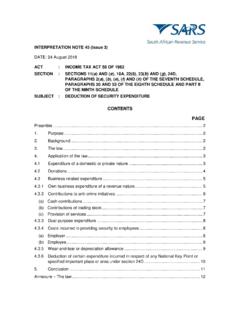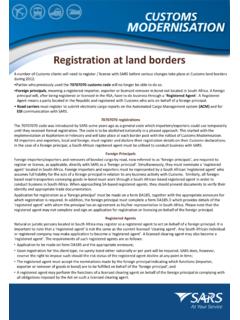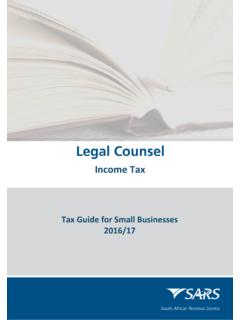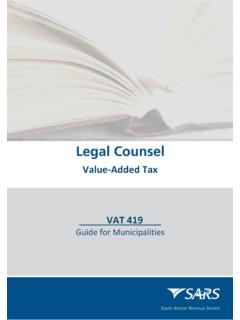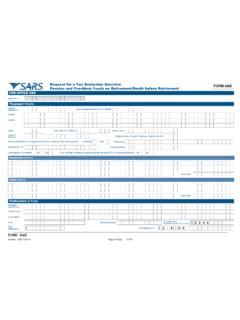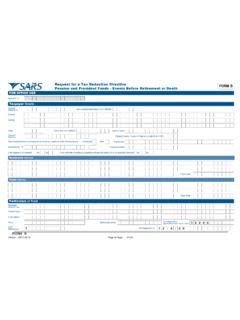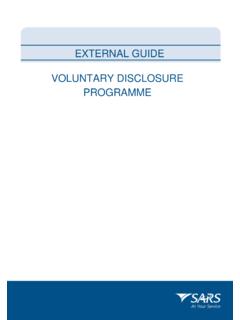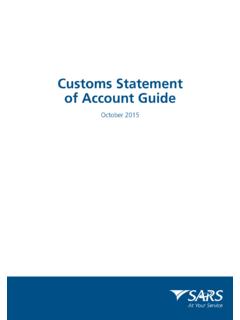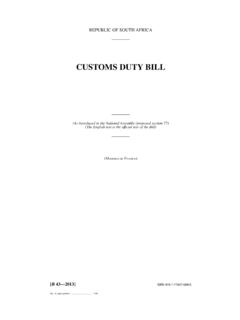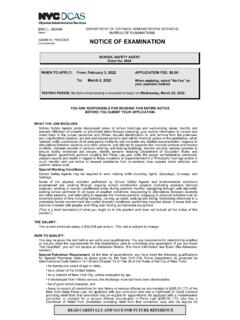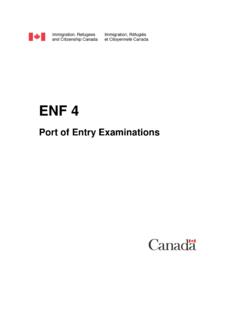Transcription of SECTION : SECTION 23(m - South African Revenue Service
1 INTERPRETATION NOTE: NO. 13 (Issue 3). DATE: 15 March 2011. ACT : INCOME TAX ACT NO. 58 OF 1962 (the Act). SECTION : SECTION 23(m). SUBJECT : DEDUCTIONS: LIMITATION OF DEDUCTIONS FOR EMPLOYEES AND. OFFICE HOLDERS. Preamble References to sections are to sections of the Act, unless otherwise stated. 1. Purpose This Note provides clarity on the deductions that may be claimed by employees and office holders. This update incorporates the changes made in terms of SECTION 18(1)(g) and SECTION 37(1)(c) of the Revenue Laws Amendment Act No. 60 of 2008, which introduced sections 11(nA) and (nB) into the Act and amended SECTION 23(m). 2. background SECTION 23(m) was introduced to limit the deductions that may be claimed by employees and office holders against their employment income. The limitation excludes agents and representatives whose remuneration is normally derived mainly in the form of commission based on sales or turnover attributable to that agents or representatives.
2 SECTION 23(m) has been periodically updated to expand the deductions that employees and office holders may claim. The most recent amendment provides that, if certain amounts were received by or accrued to an employee and were included in the employees' taxable income, where any portion of that amount is refunded by the employee to the employer, the refunded amount will be allowed as a deduction against the employee's taxable income. The same principle applies to restraint of trade payments that were previously included in taxable income, and were subsequently refunded by the employee. To the extent that the employee's taxable income is insufficient in any particular year of assessment, the deduction for the repaid benefit may create an assessed loss, which may be carried forward to the following tax year. 2. 3. The law SECTION 23(m) of the Act reads as follows: 23. Deductions not allowed in determination of taxable income. No deductions shall in any case be made in respect of the following matters, namely.
3 (m) subject to paragraph (k), any expenditure, loss or allowance, contemplated in SECTION 11, which relates to any employment of, or office held by, any person (other than an agent or representative whose remuneration is normally derived mainly in the form of commissions based on his or her sales or the turnover attributable to him or her) in respect of which he or she derives any remuneration, as defined in paragraph 1 of the Fourth Schedule, other than . (i) any contributions to a pension or retirement annuity fund as may be deducted from the income of that person in terms of sections 11(k) or (n);. (ii) any allowance or expense which may be deducted from the income of that person in terms of SECTION 11(c), (e), (i) or ( j);. (iiA) any deduction which is allowable under SECTION 11(nA) or (nB). (iii) any deduction which is allowable under SECTION 11(a) in respect of any premium paid by that person in terms of an insurance policy, to the extent that.
4 (aa) it covers that person against the loss of income as a result of illness, injury, disability or unemployment; and (bb) the amounts payable in terms of that policy as contemplated in item (aa) constitutes or will constitute income as defined; and (iv) any deduction which is allowed under SECTION 11(a) or (d) in respect of any rent of, cost of repairs of or expenses in connection with any dwelling house or domestic premises, to the extent that the deduction is not prohibited under paragraph (b); . 4. Application of the law The wording of SECTION 23(m) is analysed and interpreted below: Wording Interpretation No deductions shall in any case be SECTION 23 contains a number of prohibitions on deductions. made in respect of the following Paragraph (m) of SECTION 23 is one of them. matters, namely . subject to paragraph (k) Paragraph (k) of SECTION 23 prohibits certain deductions for labour brokers without an exemption certificate and personal Service providers.
5 The application of paragraph (m) is subject to the application of paragraph (k), which means that a personal Service provider or a labour broker that falls under the restrictions imposed by paragraph (k) will remain restricted under that paragraph despite the provisions of SECTION 23(m). any expenditure, loss or Before the introduction of SECTION 23(m) an employee or holder allowance, contemplated in of an office could under certain (in practice very limited). SECTION 11 circumstances have been entitled to claim a deduction under SECTION 11. With effect from 1 March 2002 this is, with a few exceptions, no longer possible. [See examples A and B of Annexure A]. 3. The prohibition on the deduction of expenditure, losses and allowances only applies to expenditure, losses and allowances that would otherwise have been deductible under SECTION 11. Deductions for medical expenditure under SECTION 18 and donations to approved public benefit organisations under SECTION 18A remain available.
6 Subsistence and travelling expenses under SECTION 8(1)(b) or (c), or the expenditure listed under SECTION 8(1)(d) in respect of holders of a public office, are not expenditure, losses or allowances claimed under SECTION 11, but are amounts taken into account in the determination of the amount to be included in taxable income, and are thus not affected by the limitation imposed by SECTION 23(m). [See Example B of Annexure A]. which relates to any employment The prohibition on deductions applies to expenditure, loss or of, or office held by, any person allowances which relate to the employment of any person or to an office held by any person. The term employment , in this context, should be afforded its narrower meaning of an employer-employee (master-servant). relationship. An independent contractor is therefore not affected by the prohibition on deductions. [See Example B of Annexure A]. The holding of an office generally flows from an appointment (such as the President of South Africa, Ministers in the Cabinet, and Judges, as well as directors of companies) whereas the holding of employment flows from a contract and is something in the nature of a post.
7 (other than an agent or An agent or representative whose remuneration is normally representative whose derived mainly in the form of commission based on sales or remuneration is normally derived turnover that is attributable to that agent or representative is mainly in the form of commissions excluded from the provisions of SECTION 23(m). The term based on his or her sales or the remuneration in this context is not necessarily as defined in turnover attributable to him or her) the Fourth Schedule, that is. it is a general reference to a reward or pay received in return for services rendered or work done. The term mainly is interpreted to mean more than 50%. of the taxpayer's gross remuneration. This means that the total income of the taxpayer (including 100% of all allowances) must be compared to his or her commission income. Furthermore, where the commission is more than 50% of the gross remuneration, the agent or representative who is in this position may continue to be granted permissible deductions under SECTION 11.
8 [See examples C, D, E and F of Annexure A]. In the event that an agent or representative did not derive more than 50% commission income for the year of assessment, but it can nevertheless be shown that his or her income normally consists of more than 50% commission, the limitation of SECTION 23(m) will not be applicable. The test for normally is a subjective test and each case must be evaluated on its own merits, with due regard to the taxpayer's previous and future years of assessment. For purposes of SECTION 23(m) the terms agent , representative and commission should be interpreted as follows: Agent a person authorised or delegated to transact business for another. Representative one who represents another or others. Commission a percentage of sales or turnover of the person on behalf of whom the agent or representative is acting. 4. in respect of which he or she The prohibition on deductions applies to natural persons only. derives any remuneration, as The prohibition applies to expenditure, losses and allowances defined in paragraph 1 of the that relate to remuneration as defined in the Fourth Schedule Fourth Schedule, to the Act.
9 Expenditure, losses and allowances that relate to income other than remuneration may therefore still be considered for deduction. An employee or office holder in receipt of two or more streams of income may thus be in a situation where the deduction of expenditure, losses or allowances relating to a remuneration stream of income is prohibited, while expenditure, losses or allowances relating to another trade remain deductible. [See Example B of Annexure A]. other than These expenses and allowances are still deductible by an office holder or an employee: any contributions to a pension or Contributions to a pension or retirement fund subject to the retirement annuity fund as may be limits imposed by sections 11(k) and (n). deducted from the income of that person in terms of sections 11(k). or (n);. any allowance or expense which Qualifying legal expenses [ SECTION 11(c)]. may be deducted from the income Wear-and-tear allowances on items used for purposes of of that person in terms of trade, such as computers or books [ SECTION 11(e)].
10 SECTION 11(c), (e), (i) or (j); Bad debts, for example, income which was not paid to the employee as a result of the insolvency of the employer [ SECTION 11(i)]. Doubtful debts [ SECTION 11(j)]. any deduction which is allowable Any amount, including a restraint of trade payment, received by under SECTION 11(nA) or (nB) or accrued to an employee or office holder that was included in that taxpayer's taxable income, and was refunded by that taxpayer. Only amounts actually refunded may be claimed as a deduction. [See Example H of Annexure A]. any deduction which is allowable It is crucial to ensure that the premium is deductible under under SECTION 11(a) in respect of SECTION 11(a) as premiums that do not qualify for a deduction any premium paid by that person under SECTION 11(a) are in any event not permitted. in terms of an insurance policy, to the extent that . it covers that person against The policy must provide cover against the loss of income as a the loss of income as a result result of one of the following: of illness, injury, disability or illness.
